Hives - Causes, Symptoms & Treatments
Hives, or ‘Urticaria’ in medical parlance, is a skin condition characterized by the appearance of itchy swellings on the skin surface. Hives may break out on any part of your body and can be of different sizes. It is not a prolonged condition and generally lasts for a few hours. Urticaria or hives usually occur due to the secretion of certain chemical substances such as “histamine” from underneath the skin surface.
Some of the possible causes of hives are mentioned below:
- Overexposure to sunlight
- As a side effect of medicines such as aspirin, painkillers or antibiotics.
- Insect bites
- Any food related allergy may also trigger hives
- People allergic to certain chemicals or latex can also develop hives
- Sensitivity to temperature or water can cause hives
- Infections such as Hepatitis or chronic diseases such as thyroid may result in the occurrence of hives.
- Alcohol or caffeine intake can cause chronic urticaria
The most common symptoms of Hives include:
- Skin becomes swollen
- Frequent itching sensation
- Skin inflammation is also common
- You may feel a burning sensation
- Within a short span of time, it may disappear and then again reappear on different parts of the body
- Red and white patches appear all over the skin surface known as “wheals”
Hives generally go untreated as the condition subsides within a few hours. But sometimes, hives can be chronic or acute in nature. If so, it would require treatment as it can give rise to further complications. Some of the treatment methods are given below:
- Corticosteroids may be prescribed by the doctor to control the formation of hives and give relief from inflammation.
- Antihistamines (drugs which hinder the impacts of histamines; mainly used for curing allergies) are advised to patients with chronic urticaria. It controls the effects caused due to the discharge of histamines.
- Knowing and avoiding the trigger conditions may prove to be helpful.
- Applying menthol creams can give comfort due to its cooling properties. If you wish to discuss about any specific problem, you can consult a dermatologist.



+1.svg)
